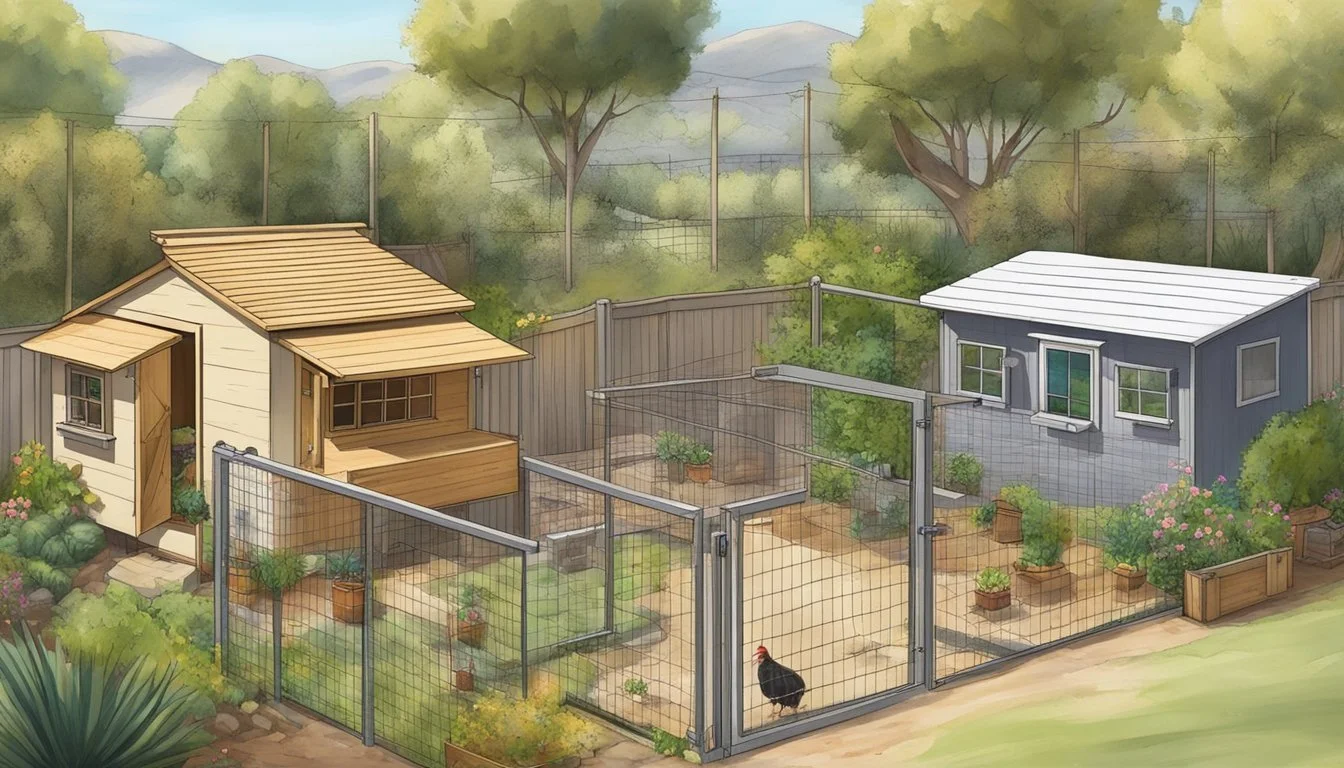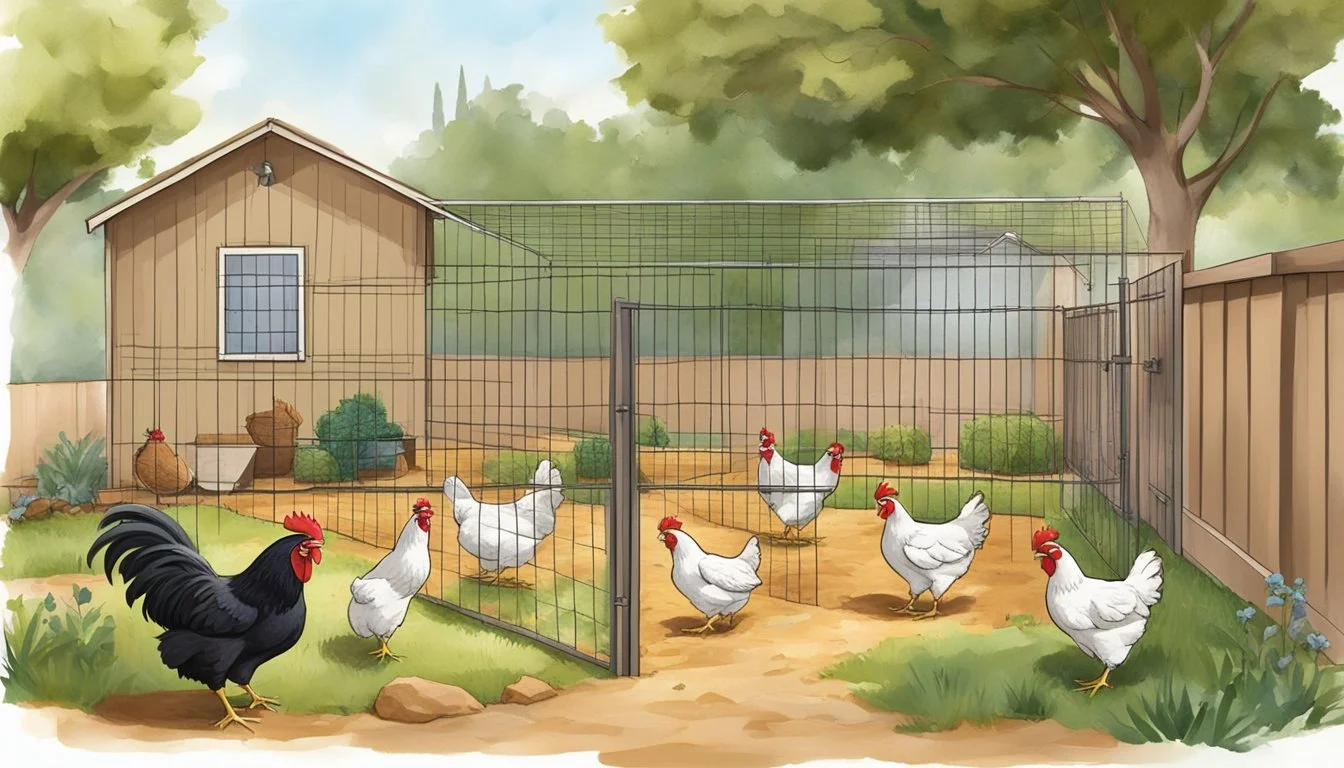Keeping Backyard Chickens in Escondido, CA
Essential Tips for Success
Keeping backyard chickens has become increasingly popular as people seek sustainable living practices and a closer connection to their food sources. In Escondido, CA, urban and suburban residents alike are embracing the trend. The city's ordinances have evolved to accommodate this shift towards small-scale, backyard farming, with specific guidelines that encourage residents to maintain these animals responsibly.
As of July 23, 2012, Escondido residents living in R-1 zones are allowed to keep up to six hens in their backyard, but roosters are prohibited. This reflects a growing acknowledgment of the benefits of raising chickens, such as the provision of fresh eggs, pest control, and the enjoyment of their companionship. However, it balances these benefits with considerations for neighborhood peace by disallowing roosters, which are often associated with noise complaints.
Residents interested in keeping backyard chickens in Escondido should familiarize themselves with the local regulations to ensure compliance. They should verify their zoning classification and confirm the most current ordinance details, as city policies may change. This level of due diligence ensures that both chicken enthusiasts and their neighbors can enjoy a harmonious environment.
Understanding Local Regulations and Zoning Laws
Navigating the intricacies of local regulations and zoning laws is crucial for Escondido residents interested in keeping backyard chickens. Adherence to these laws ensures that chicken owners operate within the legal guidelines set by the local government of Escondido and the broader regulations of San Diego County and the state of California.
Escondido Zoning Ordinance
In Escondido, the zoning ordinance is a key component governing the keeping of chickens. Residents must refer to the R1 zoning code to determine the specific number of chickens allowed on their property. The regulations restrict the number of chickens based on the lot size, and explicitly prohibit the keeping of roosters to prevent noise issues. Additionally, the allowance of other domesticated birds and fowl is combined with the chicken count on any given lot.
Permitting Process in Escondido
Individuals who wish to raise backyard chickens in Escondido may be required to navigate a permitting process. This involves consulting with local zoning officials to obtain accurate information on the number of chickens permitted per residential lot. The lot size often dictates whether a permit is necessary, and potential chicken owners should consult the local government to understand any specific requirements or exceptions.
Local Ordinances Across California
Keeping backyard chickens is also subject to broader regulations that vary across cities and counties within California. Local ordinances in San Diego County and statewide may impose restrictions beyond those found in Escondido. These can include, but are not limited to, space requirements per chicken, the location of coops relative to dwellings, and adherence to health and safety standards. As such, prospective chicken owners should research local laws and CC&Rs (Covenants, Conditions, & Restrictions) to ensure full compliance.
Planning Your Chicken Coop
When establishing a backyard chicken coop in Escondido, CA, residents must consider design for safety and ventilation, adhere to specific location requirements, and maintain cleanliness to promote a healthy environment for their chickens.
Designing a Safe and Ventilated Coop
The design of the coop should prioritize safety and ventilation. Coops must be predator proof to protect chickens from common predators such as foxes, raccoons, and hawks. This includes secure latching mechanisms and sturdy construction materials. Ventilation is equally important to prevent respiratory issues and regulate temperature; therefore, the coop should include vents or windows that allow for airflow while keeping rodents out.
Security Measures: Latches, reinforced wire mesh, solid walls
Ventilation: Sliding windows, vents near the roof, mesh-covered openings
Location and Setback Requirements
The coop's location on the property must comply with setback requirements to respect neighboring properties and abide by local ordinances. There should be a minimum distance of 50 feet from the coop to any neighboring home. This ensures minimal disturbance to neighbors and aids in controlling any potential odor or noise.
Setback Distance: 50 feet minimum from neighboring homes
Fenced Area: Fully enclosed runs to prevent chickens from straying
Maintaining a Clean and Healthy Environment
Regular maintenance is critical to avoid the buildup of waste and prevent the spread of disease. A routine should be established for composting chicken waste and cleaning the coop. Nesting boxes should be kept clean, and waste management practices, such as regular composting, help in maintaining a hygienic environment.
Waste Management: Composting systems, frequent waste removal
Coop Maintenance: Daily checks, periodic thorough cleaning
Caring for Chickens
Keeping chickens in Escondido, CA requires attention to their diet, protection, and regular health monitoring. Proper care ensures the health of the chickens and a steady supply of fresh eggs.
Feeding and Nutrition
Chickens need a balanced diet to remain healthy and produce quality eggs. They should have access to:
Starter Feed: For chicks up to 6 weeks old, providing essential nutrients for growth.
Grower Feed: Served to pullets from 6 weeks until they lay their first egg.
Layer Feed: For hens laying eggs, rich in calcium to strengthen eggshells.
Additionally, kitchen scraps and insects can supplement their diet but should not replace their primary feed. Clean, fresh water must be available at all times.
Protecting from Disease and Predators
To safeguard chickens from disease and predators, one should:
Secure Housing: Build a predator-proof coop, with sturdy walls and a secured floor.
Cleanliness: Regularly clean the coop to prevent disease and parasite infestation.
Vaccinations: Administer necessary vaccines to prevent common chicken diseases.
Observation: Keep an eye for signs of illness, such as lethargy or changes in eating habits.
Contacting a vet familiar with poultry is crucial if disease is suspected, and they may prescribe antibiotics as part of the treatment.
Routine Maintenance and Health Checks
Regular maintenance includes:
Daily Observations: Check for abnormal behavior or signs of illness.
Weekly Coop Cleaning: Remove waste and refresh bedding.
Monthly Inspections: Examine chickens for mites, lice, and overall health.
Record observations and any health concerns in a blog or journal to track the flock's well-being over time.
Understanding Animal Limits and Restrictions
When keeping backyard chickens in Escondido, residents must adhere to specific regulations regarding the quantity and types of fowl permissible on their property. These rules ensure neighborhood harmony and animal welfare.
Number of Chickens Allowed
The city of Escondido allows residents to keep a maximum of 25 domesticated birds/fowl per parcel. This total encompasses a combination of chickens, ducks, turkeys, peafowls, and similar fowl. Residents should check whether their parcel zoning accommodates this activity.
Restrictions on Roosters
While hens are commonly permitted as backyard chickens, Escondido places restrictions on the keeping of roosters due to noise considerations. Potential owners should consult with local zoning regulations to ensure compliance before acquiring or keeping roosters on their property.
Making Your Backyard Chicken-Friendly
Creating an environment that caters to the needs of backyard chickens is pivotal for their health and egg production. Choosing to free-range the chickens allows them natural foraging opportunities and contributes to a dynamic ecosystem within one's yard.
Creating a Free-Range Environment
To prepare a free-range habitat in a residential area, such as Escondido's R1 zone that allows chicken keeping, one should assess the space available. An adequate amount of space ensures chickens can forage, which is essential for their well-being.
Secure Fencing is crucial to protect chickens from predators and to prevent them from wandering beyond property lines. A fence height of about 4 to 6 feet is typically sufficient to contain chickens.
Shelter offers chickens protection from the elements and a place to retreat. Coops should be spacious with at least 3 square feet per chicken.
Vegetation such as shrubs and trees provides shade and contributes to the chickens' diet with insects and leafy greens.
Dust Baths can be established by creating shallow pits filled with sand, which helps chickens maintain their feather health.
Fresh Water should be accessible at all times, with containers cleaned regularly to prevent algae and bacteria growth.
One must also abide by local ordinances when creating such environments, ensuring that all activities align with the regional regulations concerning backyard livestock in residential areas.
Considerations for Chicken Keepers in Urban Areas
Urban chicken keeping requires thoughtful consideration of local regulations and community relations. Keepers must be aware of the specific laws in their city, as these can greatly impact how they approach raising chickens in a backyard setting.
Impact on Neighbors and Property Lines
One must consider the proximity to neighbors when raising chickens in urban areas like Escondido. City ordinances often dictate the distance chicken coops must be from property lines to prevent noise and odor affecting neighboring properties. For instance, some cities require coops to be at least 20 feet from a neighbor's dwelling. Keeping coops clean and ensuring they are watertight can mitigate these issues. Additionally, noise from roosters is a common concern; hence, many urban areas restrict or ban rooster keeping to minimize disruptions.
Engaging with the Community
Positive engagement with the community is beneficial for urban chicken keepers. Informing and involving neighbors may alleviate potential concerns regarding the keeping of chickens. Providing educational resources about the benefits of backyard fowl, such as pest control and the provision of fresh eggs, can foster community support. Moreover, participating in local urban agriculture initiatives or groups can connect keepers with like-minded individuals for advice and assistance. It's essential to note that in addition to chickens, some city ordinances also cover the keeping of other fowl and small animals like rabbits, each with their specific guidelines.
Urban chicken keepers in Escondido should always adhere to current city regulations regarding backyard poultry and engage positively with their local community to ensure a harmonious and successful experience.
Local Resources for Chicken Keepers
In Escondido and surrounding areas, backyard chicken keepers have access to a variety of local resources designed to support healthy and legal chicken raising practices. These resources range from veterinary care to community based support systems that advocate for and educate on responsible chicken keeping.
Finding Veterinary Care
Escondido residents with chickens can benefit from a network of animal health experts skilled in avian care. Clinics in the San Diego area, such as the San Diego Avian Veterinary Clinic, offer comprehensive services for poultry. Additionally, veterinarians in surrounding cities like Carlsbad, Temecula, and La Mesa are equipped to address the needs of backyard flocks.
San Diego Avian Veterinary Clinic
Address: 123 Bird Road, San Diego, CA
Services: Health check-ups, vaccinations, emergency care
Temecula Poultry Health Center
Address: 456 Chicken Lane, Temecula, CA
Services: Disease management, nutritional advice
La Mesa Bird Clinic
Address: 789 Winged Blvd, La Mesa, CA
Services: General check-ups, disease prevention strategies
It is encouraged for chicken keepers to establish a relationship with a local avian veterinarian to ensure prompt access to care when needed.
Community Support and Education
Escondido is home to an active community of chicken enthusiasts. The local feed store, Escondido Feed, not only provides supplies but also serves as a hub for networking and sharing best practices among poultry keepers. Educational workshops and events frequently take place here and in similar establishments throughout San Diego County.
In addition to local feed stores, online community forums and social media groups offer daily support and advice. Organizations like the Southern California Poultry Federation in nearby counties, including Los Angeles and Orange, further reinforce the knowledge base with seminars and fairs that focus on backyard chicken care.
Escondido Feed
Address: 100 Farmer Ave, Escondido, CA
Offerings: Supplies, informal education, community events
Southern California Poultry Federation
Web: SoCalPoultry.org
Offerings: Seminars, fairs, breed-specific information
These resources ensure that Escondido's chicken keepers are well-informed and supported in their avian endeavors.








